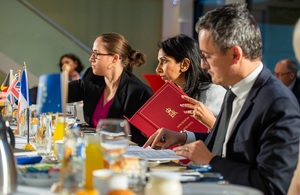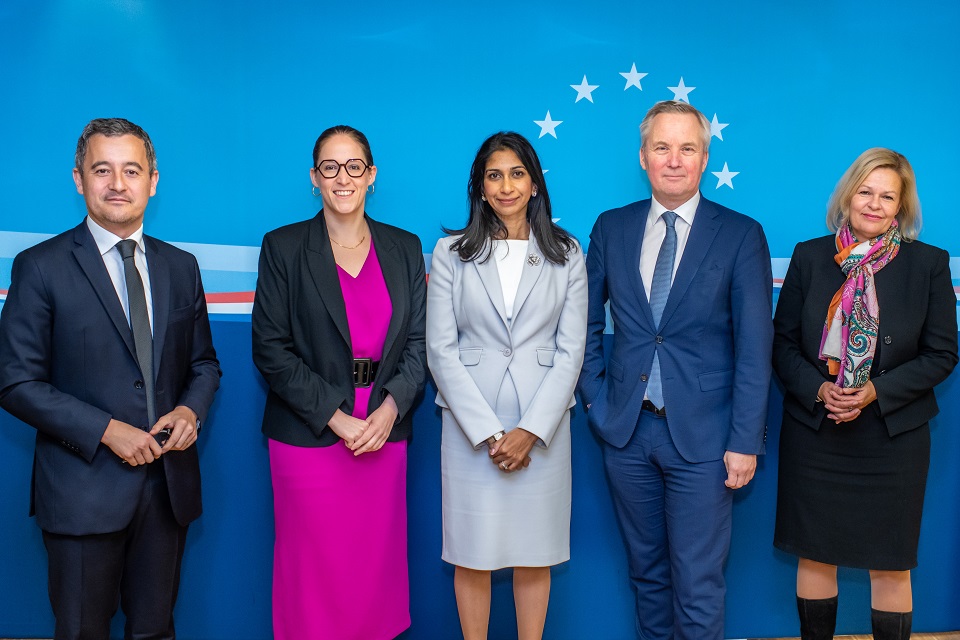Calais group agrees to further work to tackle illegal migration
Home Secretary and European counterparts meet to renew discussions on how to crack down on illegal migration and people trafficking.

Plans to step up co-operation to tackle illegal immigration across Europe and bring people smugglers to justice have been agreed today at a meeting of the Calais Group.
Home Secretary Suella Braverman met with counterparts from France, Belgium, Germany and the Netherlands, in the presence of the European Commission and its agencies, in Brussels this morning to renew discussions on how to address the global migration crisis. The group has published a Joint Communique outlining commitments made at the meeting.
The UK will agree a working arrangement with Frontex, Europe’s external border agency, to bolster its upstream efforts to contain illegal migration, as other countries also committed to bolster their support. Working together at Europe’s land and sea borders will enable countries to improve registration of irregular migrants and ensure rapid asylum and returns procedures, so that illegal migration flows are reduced at source. Frontex has a particular focus on tackling migration from western Balkans countries.
Ministers also agreed to enhance cooperation of the Joint Intelligence Cell situated in Calais, to allow operational teams to better identify and respond to criminal networks. The cell has dismantled 59 organised crime groups involved in illegal crossings since it was set up in July 2020.
Today’s meeting also saw ministers agree to deeper co-operation with third countries to work on shared migration challenges and ensure people do not undertake perilous journeys in the first place.

Home Secretary Suella Braverman said:
Countries across Europe must work closely together to tackle illegal migration and crack down on the people smugglers before these issues reach our borders.
The Calais Group have held constructive discussions today on bringing solutions that will benefit all our countries and to ensure the evil criminals who profit in human misery are targeted and brought swiftly to justice. I look forward to our ongoing cooperation.
Ministers welcomed the joint progress achieved since November 2021. The Prime Minister and Home Secretary have been driving forward efforts to step up international cooperation to tackle this joint challenge, most recently through the signing of the UK-France agreement to enhance co-operation on illegal migration. The ministers also set out how irregular migration into Europe is a growing issue, with detections of irregular crossings at land and sea borders 74% higher than last year.
Ministers also agreed to support a working arrangement between the UK and Frontex, to facilitate better joint working to tackle illegal migration. European partners and their agencies, like the National Crime Agency (NCA) and Europol, continue to work closely on the ground to tackle illegal migration and bring perpetrators of organised crime to justice. For example, the NCA led Operation Punjum in July, the biggest ever international operation of its kind, alongside Operation Thoren in Europe, to target an organised crime group suspected of smuggling up to 10,000 people across the Channel in the last 12 to 18 months.
In the face of increasing Channel crossings in 2022, the UK has already put in place a wide range of measures to tackle the issue internationally. That includes signing a new agreement with France which will see UK officers embedded in French operations for the first time ever as part of a reciprocal agreement, as well as a 40% uplift in the number of officers patrolling French beaches – helping step up efforts to detect and disrupt crossings before they leave France. Co-operation with France has led to the prevention of over 31,000 migrants crossing via small boats so far this year and our work with French law enforcement has secured the arrest of 384 suspected people smugglers this year alone. This work comes alongside the measures we brought forward through our Nationality and Borders Act, our work to deliver the Rwanda partnership, and efforts to expedite the removal of individuals by agreeing tailored bilateral returns agreements with partners like Albania.
Today also marks a further step forward in delivering the new UK-France deal, as French officers join their UK counterparts in Dover to continue their operational training as part of the reciprocal agreement to embed officers in operations – following a visit by UK officers to France last month.